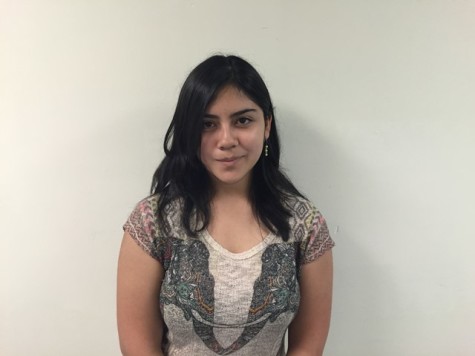Why I Love Being Hispanic
Editors from The Round Table share what their heritage means to them
October 13, 2015
Every year, Americans celebrate Hispanic Heritage Month, a holiday that honors Hispanic-Americans and their contributions to society. In honor of Hispanic Heritage Month, which is from Sept. 15 to Oct. 15, The Round Table has interviewed some of its Hispanic editors about their heritage. The interviews are in Spanish, with the translations below!
Editor-in-Chief, Gissel Campos.

Q: ¿Qué es tu cosa favorita de tu país?
What is your favorite thing about your country?
A: Mi cosa favorita de El Salvador es que el país es hermoso. Tiene muchas playas, parques, y volcanes que puedes visitar. Mi lugar turístico favorito se llama ‘Los Chorros de la Calera.’ Son cascadas grandes, las cuales votan agua en piscinas donde te puedes bañar.
Translation: My favorite thing about El Salvador is that the country is beautiful. It has many beaches, parks, and volcanos that you can visit. My favorite tourist attraction is “Los Chorros de La Calera.” They’re large waterfalls that fall into a pool that you can swim in.
Q: ¿Qué recomiendas que alguien pruebe?
What dish would you recommend someone try?
A: Recomiendo que prueben la pupusa. Es el plato principal de El Salvador. Es parecida a una tortilla, pero lleva queso adentro. Algunas pupusas también llevan frijoles, chicharrón, y chipilín, una planta que crece en El Salvador.
I recommend they try the “pupusa”. It’s the main dish of El Salvador. It looks like a tortilla but with cheese inside. Some pupisas also have beans, pork and chipilin, a plant that grows in El Salvador.
Q: ¿Qué diferencia a tu país de otros países hispanos?
What sets your country apart from other Hispanic countries?
A: Mi país tiene un acento único. Usa la forma ‘vos’ en vez de ‘tú.’ Aunque otros países también usan esa forma, como Argentina, los salvadoreños hablan de una forma que no se escucha en otros países.
Translation: My country has a unique accent. It uses the less common form of ‘you.’ Even though they also use it in other countries, such as Argentina, Salvadorians use it in a form that you don’t hear in other countries.
Q: ¿Hay alguna tradición que practica tu familia?
Is there something traditional you and your family do?
A: Aparte de comer platos tradicionales, mi familia no tiene muchas tradiciones culturales.
Translation: Besides eating the traditional dishes, my family doesn’t have many cultural traditions.
Fashion Editor, Jenny Trejo

Q: ¿Qué es tu cosa favorita de tu país?
What is your favorite thing about your country?
A: Mi cosa favorita de Cuba es que la gente siempre están felices, siempre se están riendo y haciendo chistes. En cada esquina hay personas jugando domino con música bien alta y otros bailando y cantando.
Translation: My favorite thing about Cuba is that the people are always happy, they are always laughing and making jokes. On every corner you see people playing dominos with really loud music, and others dancing and singing.
Q: ¿Qué recomiendas que alguien pruebe?
What dish would you recommend someone try?
A: Recomiendo el plato tradicional, que es congris (arroz y frijoles cocinados juntos), con yuca frita y ropa vieja (es un poco como carne molida), especialmente cocinado por mi mamá .
Translation: I recommend the traditional dish, which is congris (rice cooked with beans), with fired yucca and “ropa vieja” (shredded meat), especially cooked by my mom.
Q: ¿Qué diferencia a tu país de otros países hispanos?
What sets your country apart from other Hispanic countries?
A: Aunque es un país bien aislado, conocen mucho de cultura y les interesa mucho. Les gusta mucho conocer más, saben mucho de artistas, cantantes y escritores. No lo digo solo porque soy cubana, pero los cubanos son muy inteligentes. Cuando yo fui a Cuba hace como cinco años, mis primas conocían a Justin Bieber y lo encontré muy chistoso que hasta conocían las letras de sus canciones mejor que yo.
Translation: Even though it’s a very isolated country, they are very cultured and are very interested by other cultures. They love learning; they know a lot about artists, singers, and writers. I don’t just say it because I’m Cuban, but I find that Cubans are very intelligent.
Q: ¿Hay alguna tradición que practica tu familia?
Is there something traditional you and your family do?
A: Lamentablemente, mi familia es un poco más americanizada. Mi mamá vino a los 25 años y era la primera de la familia, y al pasar los años vinieron mas familiares pero viven en otros estados, mi tío es el único que vive en Stamford con nosotros.
Translation: Sadly, my family is more Americanized. My mom came to the United States when she was 25 years old and she was the first in the family. As the years passed, more family members came but they live in other states; my uncle is the only one who lives in Stamford with us.
Science/Technology Editor, Juan Estanislado

Q: ¿Qué es tu cosa favorita de tu país?
What is your favorite thing about your country?
A:Mi parte favorita de Perú es la comida. Esto es porque la comida Peruana es deliciosa y es conocida por todo el mundo como uno de los mejores estilos. En los mejores restaurantes del mundo Perú toma los puestos 4, 14 y 44. Tenemos cocineros come Gaston Acurio y Virgilio Martinez, quenes son conocidos en todo el mundo.
Translation: My favorite part of Peru is the food. This is because Peruvian food is delicious and it’s very well-known around the world for its special style. For the best restaurants in the world, Peru comes in 4th, 14th, and 44th. Some very well-known Peruvian chefs are Gaston Acurio and Virgilio Martinez.
Q: ¿Qué recomiendas que alguien pruebe?
What dish would you recommend someone try?
A: Perú ha sido reconocido por sus diferentes tipos de comida. La razón es porque hay muchos ambientes diferentes. Eso a causado muchas culturas distintas con differente comidsa. Un plato que ha superado todos los otros platos es el ceviche. Ceviche es pescados or mariscos marinado en limón servido a lado de papa y cebollas.
Translation: Peru is known for the many different types of food. The reason why is because there are many different types of cultures with different types of dishes. One dish that has surpassed others is “ceviche.” Ceviche is fish and shrimp marinaded in lime and served next to potatoes and onions.
Q: ¿Qué diferencia a tu país de otros países hispanos?
What sets your country apart from other Hispanic countries?
A: Perú es famoso por muchas cosas. Machu Pichu, la capital de los Incas, está en Perú y también estan las líneas de Nazca. También es reconocido por su comida y el invento del Pisco, que es una bebida alcohólica. Comparado a otros países, Perú tiene una historia más rica.
Translation: Peru is famous for many different things. Machu Pichu, the capital of the Incas, is in Peru and there is also the lines of Nazca. Also, it is very well-known for its food and the invention of Pisco, which is an alcoholic drink. Compared to other countries, Peru has a richer history
Q: ¿Hay alguna tradición que practica tu familia?
Is there something traditional you and your family do?
A: Regularmente los fines de semana mi mamá y papá cocinan comidas Peruanas como anticuchos o papa rellena. Después vemos unas películas en español y practicamos puramente en español para que mi hermano y yo nos mejoremos.
Translation: Regularly on weekends my mom and dad cook Peruvian food such as “anticuchos”or “papa rellena.” After, we watch movies in Spanish and we practice our studies in Spanish so my brothers and I can improve.






Mr. Katz • Oct 16, 2015 at 8:45 am
I loved this article! Sharing our diversity breeds tolerance which is the hidden gem of our school!
Maybe you could consider doing one on those of Caribbean descent, Eastern European descent, etc
Well done!